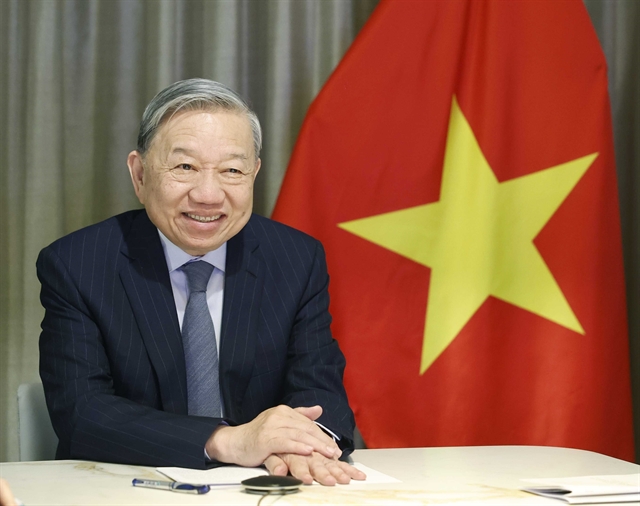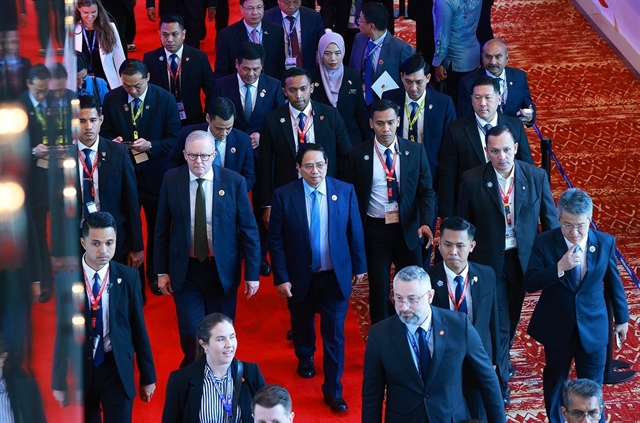 Politics & Law
Politics & Law

 |
| PM Phạm Minh Chính and other delegates at the 20th East Asia Summit in Kuala Lumpur on Monday. — VNA/VNS Photos |
KUALA LUMPUR — Prime Minister Phạm Minh Chính joined leaders from ASEAN members and partner countries, including China, the US, Russia, India, Japan, the Republic of Korea, Australia, and New Zealand, at the 20th East Asia Summit (EAS) held in Kuala Lumpur, Malaysia, on Monday afternoon, as part of the 47th ASEAN Summit and related summits.
The summit coincided with the EAS’s 20th anniversary, marking two decades of development as the region’s high-level strategic dialogue forum for political, security, and economic cooperation.
In his address, PM Chính said the world is entering a period of profound volatility and global challenges, requiring nations to bolster unity, connectivity, and multilateral cooperation to maintain an environment of peace, stability, security, and safety for sustainable and inclusive development. He stressed the need to build common ground, narrow differences, and avoid unilateral actions that could risk confrontation, disrupt supply chains, and hinder trade and investment.
Speaking highly of the EAS’s role, he called on the forum to lead in upholding international law and multilateralism, and advancing an open, inclusive, transparent, and rules-based regional order, with ASEAN at its core. He also urged the EAS to spearhead cooperation in pushing new growth drivers, particularly in sci-tech, innovation, digital transformation, and green transition.
He outlined several proposals to maintain regional peace, stability, and collaboration. First, ensuring peace and stability in the East Sea (internationally known as the South China Sea) is essential for regional cooperation and prosperity, he said, urging all parties to respect international law, especially the 1982 UN Convention on the Law of the Sea (UNCLOS), exercise restraint, avoid complicating the situation, and settle disputes peacefully, while coordinating for the full implementation of the Declaration on the Conduct of Parties in the East Sea (DOC) and the early conclusion of an effective and substantive Code of Conduct in the East Sea (COC).
Second, Việt Nam backs and stays ready to contribute to a peaceful and sustainable Korean Peninsula, calling on all parties to resume dialogue, exercise restraint, avoid escalating tension, and seriously follow the UN’s relevant resolutions, he said.
Third, he urged an end to violence in Myanmar, comprehensive dialogue, and facilitation of humanitarian assistance, thereby promoting reconciliation and paving the way for free, fair, inclusive and safe elections. He also called on partners to continue supporting and accompanying ASEAN in this process.
 |
| An overview of the 20th East Asia Summit. |
EAS leaders spoke highly of the EAS’s important role and vast cooperation potential, with 18 member countries representing over half of the world’s population and around 60 per cent of global GDP. In 2024, trade in goods between ASEAN and EAS partners neared US$1.9 trillion, while FDI inflows totaled nearly $93 billion, reflecting strong prospects for deeper regional collaboration.
They noted progress of the EAS Plan of Action for 2024-2028, and agreed to channel resources toward practical cooperation in key growth areas like innovation, digital economy, infrastructure connectivity, energy transition, green development, education, health, and disaster resilience, in line with the ASEAN Community Vision 2045.
Amid growing geopolitical tensions and strategic competition among major powers, they stressed the EAS’s role as an open, inclusive, transparent, and rules-based mechanism, with ASEAN playing a central and guiding role in shaping the regional order for peace, stability, and prosperity. They underscored the importance of multilateralism, equal dialogue, and strategic trust building.
They further stressed respect for international law, the UN Charter, and established principles of conduct; resolving disputes by peaceful means and avoiding the use or threat of force, while enhancing dialogue and coordination to reduce miscalculation risks, prevent conflicts, and maintain regional environment of peace and stability.
On global and regional issues, they highlighted the need to maintain peace, security, stability, and freedom of navigation and overflight in the East Sea, describing it as a shared interest of the region and the international community. They called for restraint, avoidance of actions that complicate the situation, and peaceful settlement of disputes in accordance with international law, including the UNCLOS 1982, along with the full and effective implementation of the DOC and early conclusion of a substantive and effective COC in line with international law.
The summit concluded with the adoption of the Kuala Lumpur Declaration marking the EAS’s 20th anniversary, and the EAS Declaration on promoting localised action in disaster risk forecasting and response, contributing to strengthening the forum’s strategic cooperation foundations toward a peaceful, stable, sustainable and prosperous region. — VNA/VNS




